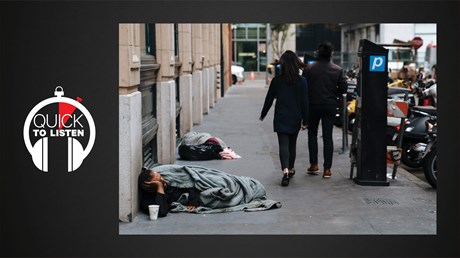How the church should help the rising number of people sleeping on the streets.

Across the country, American cities are unsuccessfully grappling with how best to address homelessness. This month, Austin criminalized sitting, lying, or camping in public. Sausalito, an upscale community in the Bay Area canceled its annual art festival when its location conflicted with the proposed place to relocate the homeless population that is currently living on the city’s waterfront. Los Angeles is considering moving forward with establishing a government-funded tent encampment.
Nationally, here’s how The New York Timessummed it up in March of this year.
"Homelessness in the United States rose for the fourth straight year, with about 580,000 people living on the streets or in temporary shelter at the start of 2020, according to an annual nationwide survey that was completed before the pandemic.
But the report, which was released on Thursday, almost certainly underestimates the spread, depth and urgency of the crisis, and not by a little, federal officials warned.
Beyond the myriad factors that leave people on streets, expiring COVID-19 moratoriums on evictions mean that millions may soon find themselves without housing.
For decades, Christian ministries have served food and offered temporary housing to people experiencing homelessness. Whose needs have these organizations traditionally met? And how successful have they been?
John Ashmen has served as the CEO of Citygate Network since 2007, previously known as the Association of Gospel Rescue Missions and is the author of Invisible Neighbors. Before he went to what’s now Citygate, he served in the COO role of the Christian Camp and Conference Association.
Ashmen joined global media manager Morgan Lee and executive editor Ted Olsen to talk about why ...
from Christianity Today Magazine
via

.gif)

.gif)

.gif)
.gif)
